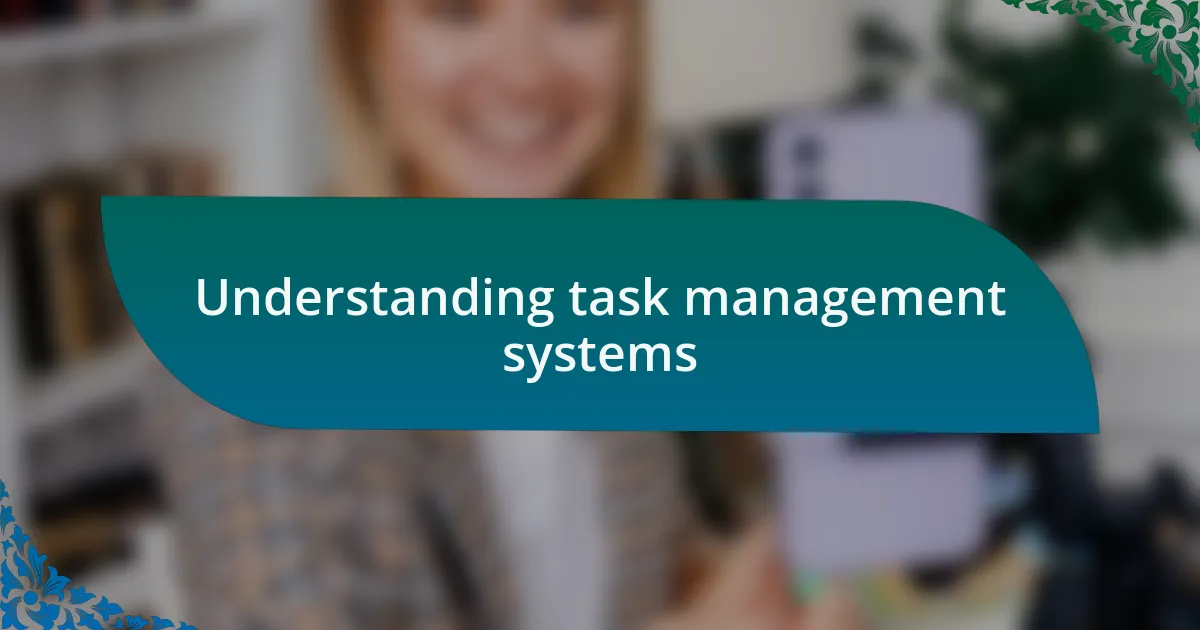Key takeaways:
- Task management systems transform chaotic workloads into structured tasks, enhancing productivity and collaboration.
- Effective task management reduces stress, improves decision-making, and fosters accountability within teams.
- Key principles of telecom technology include signal transmission, usability, and scalability, all vital for system effectiveness.
- Productivity techniques like time blocking, digital tools for task management, and the two-minute rule can significantly improve focus and efficiency.

Understanding task management systems
When I first started exploring task management systems, I was overwhelmed by the multitude of options available. What really struck me was how these systems can transform chaotic workloads into structured, manageable tasks. With so many features, it raises the question: how do you pick the right one for your needs?
As I delved deeper, I discovered that the essence of task management lies in its ability to streamline workflows. A good system doesn’t just help organize tasks; it provides a clear overview of progress, deadlines, and priorities. For instance, I remember implementing a system that allowed me to visualize my tasks as a board of sticky notes—simple yet so effective in keeping me focused and motivated.
One aspect I appreciate most is the collaborative potential of many task management tools. They not only allow teams to delegate and track tasks but also foster communication in real-time. It made me realize that effective task management can feel less like a chore and more like a team effort—one that can significantly enhance productivity and morale. Isn’t it fascinating how the right system can change not just how we work, but how we feel about our work?

Importance of effective task management
Effective task management is crucial for achieving both individual and team goals. When I began to prioritize this area, I noticed a significant drop in stress levels. The clarity that comes from organizing tasks not only frees up mental space but also allows for better decision-making. Have you ever felt overwhelmed by deadlines? I certainly have, but once I adopted a structured approach, I found myself navigating deadlines with confidence and ease.
One element that stands out to me is the direct link between effective task management and productivity. When tasks are well-defined and organized, it becomes easier to focus on what truly matters. I once worked on a project where we faced constant setbacks because our tasks were scattered and poorly defined. After implementing a more systematic approach, we not only met our deadlines but also delivered higher-quality work. It reinforced the idea that the path to success often lies in how we manage our tasks.
Moreover, I’ve seen how effective task management enhances team collaboration. When everyone is aware of their responsibilities and deadlines, the whole team operates more smoothly. I remember a particularly hectic period where poor communication led to duplicate efforts and confusion. By shifting to a well-crafted task management system, not only did we clear up the confusion, but we also fostered a culture of accountability and mutual support. Isn’t it amazing to see how much potential is unlocked when we manage our tasks effectively?

Overview of telecom technology principles
Telecom technology operates on a few fundamental principles that govern how communication systems are designed and implemented. For instance, I’ve often marveled at the importance of signal transmission; whether it’s through fiber optics or wireless radio waves, the ability to transfer data quickly and efficiently can truly make or break a system. Have you ever experienced a dropped call or lag in service? That’s where understanding these principles really matters.
Another key principle in telecom technology is accessibility and usability. Reflecting on my own experiences, I can recall times when I struggled with overly complex systems. A service that is user-friendly not only enhances customer satisfaction but also maximizes the reach of telecom services. It’s like having a well-structured roadmap; when the path is clear, users feel confident navigating their options.
Lastly, I find it fascinating how scalability plays into telecom technology principles. As the demand for bandwidth increases, systems must adapt to accommodate growth without a hitch. A few years ago, I was part of a project where our infrastructure needed a significant upgrade. By focusing on scalable solutions, we ensured that the system could not only handle current demands but also adapt to future needs. It emphasizes the notion that solid foundational principles can lead to lasting success in an ever-evolving tech landscape.

Techniques for enhancing productivity
When it comes to enhancing productivity, I often turn to the technique of time blocking. By dedicating specific chunks of time for certain tasks, I find I can maintain focus and reduce distractions. Have you ever noticed how the minutes can slip away when switching between activities? Time blocking helps me allocate my mental energy effectively, ensuring I complete tasks without constant interruption.
Another technique I cherish is the use of digital tools for task management. I recall integrating a project management app into my workflow, and the impact was nothing short of transformative. Suddenly, I had a visual overview of deadlines, priorities, and team collaboration, which not only alleviated stress but also fostered accountability. It’s incredible how the right technology can streamline processes and make the workload feel more manageable.
Lastly, practicing the two-minute rule has been a game changer for me. If a task takes less than two minutes to complete, I tackle it immediately rather than letting it linger on my to-do list. This simple technique reduces overall clutter and creates a sense of accomplishment. I’ve found that small wins throughout the day can boost my motivation and keep me on track. What simple techniques have you found effective in your productivity journey?